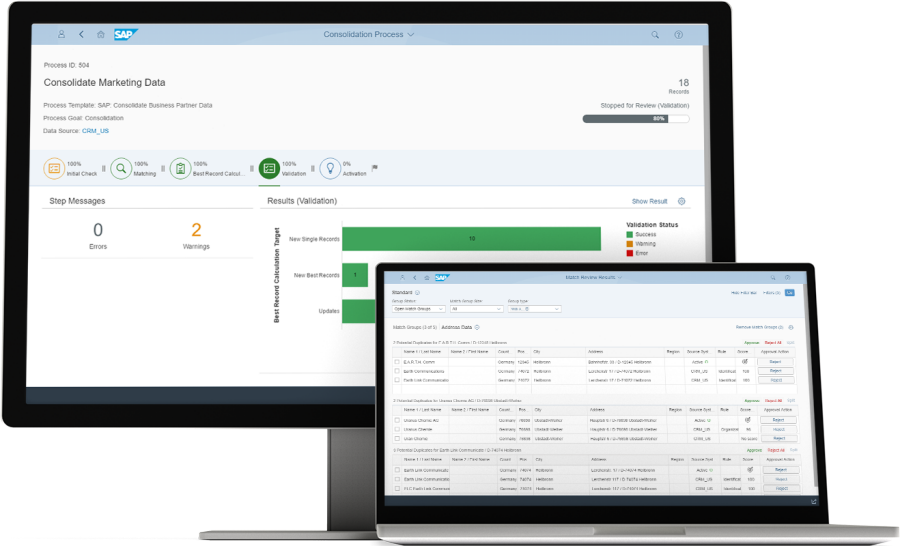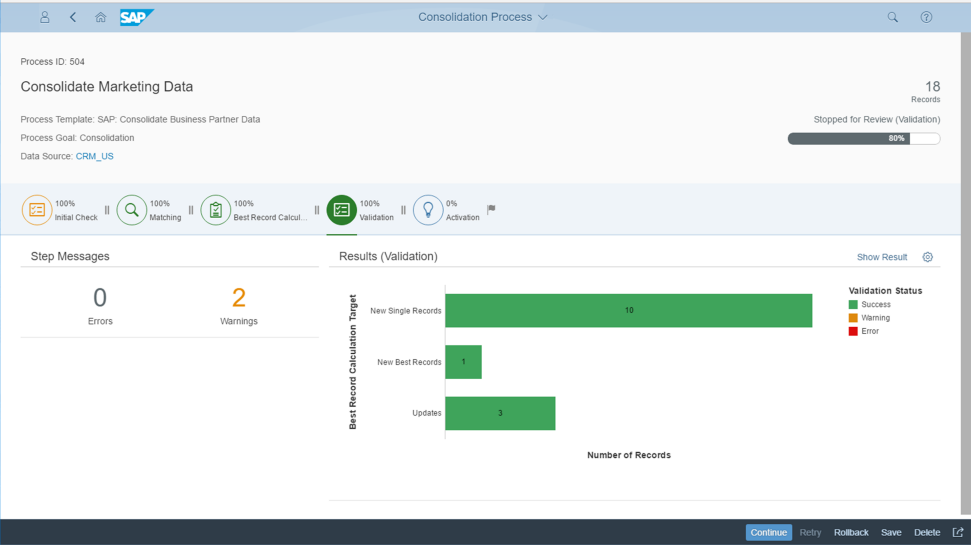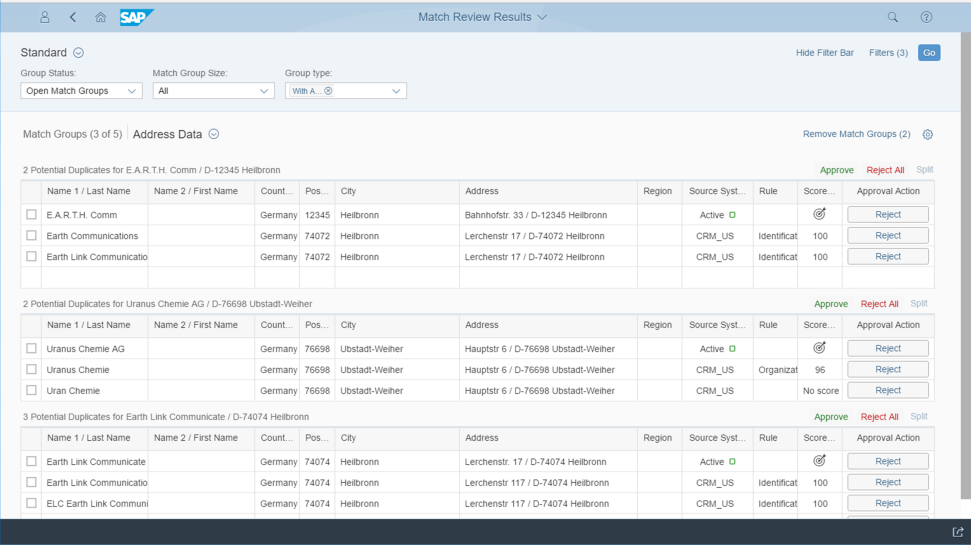For modern enterprises, clean, actual, consistent master data and the ability to manage it is priceless. It helps ensure that all the applications involved in the business processes collect and deliver complete and accurate data, thus creating an actual 360-degree view of each business area. And there's even more: integrating master data with high volumes of unstructured data and machine data helps understand real-life performance and benefit from the valuable insights. Eventually, a unified, trusted view of the business helps you work more efficiently and make better decisions.
What is SAP MDG?
SAP Master Data Governance (MDG) is a solution designed specifically for these purposes. It helps businesses maintain and manage high-quality, consistent, and reliable master data across the entire company. The solution integrates with all system applications via the SAP Business Technology Platform (SAP BTP) and acts as a central data hub that helps pull together master data and manage it centrally, ensuring its consistency, quality, and compliance with business rules and regulations. Eventually, it helps businesses reduce data duplication, ensure compliance, and streamline business processes.
Key benefits of SAP Master Data Governance
-
Data-driven decision-making
Reliable master data empowers organizations to make informed decisions. SAP MDG ensures that data is up-to-date, accurate, and accessible, supporting strategic planning and execution.
-
Enhanced data consistency across the company
SAP MDG ensures that master data remains consistent across various systems and applications. This consistency helps reduce errors, improve reporting accuracy, and support better decision-making.
-
Efficient data governance
By providing a single point of control for master data, SAP MDG streamlines governance processes. It enables data quality management, enforces business rules, and helps stay compliant.
-
Improved performance and accuracy of business processes and analytics
SAP MDG automates data governance workflows and enforces data standards. It helps reduce manual effort and errors, improving the speed of business processes and ensuring high-quality data for analytics.
-
Risk mitigation and simplified compliance
By enforcing data governance policies and workflows, SAP MDG reduces the risk of data errors, inconsistencies, and non-compliance with regulatory requirements.
-
Lower costs of data ownership and management
Automating data management processes and enforcing data governing standards minimizes the need for corrective actions and data cleansing activities, resulting in lower operational costs.
Why choose SAP Master Data Governance?
SAP Master Data Governance (MDG) helps companies keep their master data clean, consistent, and reliable. It helps businesses:
-
Reduce duplicate data, ensuring a single source of truth across all business units.
-
Enhance data quality with built-in validation rules, reducing errors and improving compliance.
-
Streamline operations with automated workflows, approvals, and governance frameworks, saving valuable time and effort.
Core capabilities of SAP MDG

- Unified data consolidation. SAP MDG enables organizations to consolidate master data from various sources, including SAP software and third-party systems, into a single application. By eliminating data silos and standardizing master data from all sources (both cloud and on-premise), SAP MDG streamlines the process of detecting duplicates and organizing data into match groups. This consolidation effort ensures the creation of a single, validated "best record" for each match group, enhancing data integrity and accuracy.
- Centralized governance. SAP MDG supports the centralized creation and maintenance of master data, facilitating automated governance processes. It integrates data governance into business processes and performs data quality checks, duplicate checks, and field validations. This approach helps control data quality and ensure compliance with organizational policies and regulatory requirements.
- Efficient data distribution. SAP MDG streamlines the distribution of validated and approved master data across SAP or third-party software systems, eliminating the need for manual maintenance in multiple systems. It supports various movement mechanisms(e.g., Web services, application link enabling, file transfers), allowing seamless data distribution independent of the mechanism used.
- Tailored data subscription. SAP MDG allows target systems to subscribe to master data distribution based on filter criteria and delta tracking, enabling tailored selection of master data for specific applications. This capability ensures each system receives relevant master data updates, optimizing data relevance and accuracy across the organization's landscape.

- Robust Quality Management. SAP MDG empowers organizations to define, validate, and monitor domain- and process-based business rules, ensuring robust data and process quality management.
- Proactive Quality Checks. With SAP MDG, organizations can proactively check data quality upon entry, automatically validating and enriching data such as supplier addresses or vendor tax codes. This proactive approach minimizes costs associated with poor data quality and ensures that data is accurate and reliable.
- Monitoring and Prioritization. SAP MDG provides dashboards for monitoring data quality elements (e.g., key process indicators, trends over time, error distribution across various domains or dimensions).
- Comprehensive support for diverse master data domains. SAP MDG offers robust support for various master data domains, business processes, and implementation styles. As a single application for managing diverse master data needs, it helps reduce the total cost of data ownership by eliminating the need for multiple disparate systems.
- Accelerated time-to-value with prebuilt data models. SAP MDG accelerates time-to-value by providing prebuilt data models, business rules, workflows, and user interfaces tailored for different master data management tasks.
- Decentralized data access. SAP MDG facilitates federated master data governance by allowing each network member to have stewardship over different sets of attributes. This approach enables the harmonization of master data across the enterprise while allowing for local customization where necessary without complex point-to-point connections.
Frequently asked questions about SAP Master Data Governance
No, SAP MDM (Master Data Management) and SAP MDG (Master Data Governance) are not the same. SAP MDM is an older standalone solution for consolidating and managing master data. Non-SAP customers can easily implement it. Also, SAP MDM is not a part of SAP’s long-term roadmap. It has been declared end-of-life, and SAP will no longer support it.
However, SAP MDG is an integrated governance solution within SAP S/4HANA, so it is suited for customers already using S/4HANA. With SAP MDG, they can ensure data quality, consistency, and compliance through workflows and validation rules.
The core benefits of SAP MDG include:
- Improved data quality. The solution eliminates duplicates, enforces consistency, and ensures data accuracy across the organization.
- Centralized data governance. With SAP MDG, you have a single source of truth for master data, ensuring compliance with policies and regulations.
- Automation and efficiency. You ensure automated workflows, approvals, and data validation, reducing manual effort and errors.
- Seamless integration. The solution works with SAP S/4HANA and other enterprise systems to enable smooth data synchronization across systems and apps.
- Data-driven decision-making. SAP MDG ensures reliable, high-quality data for more informed, strategic business decisions.


